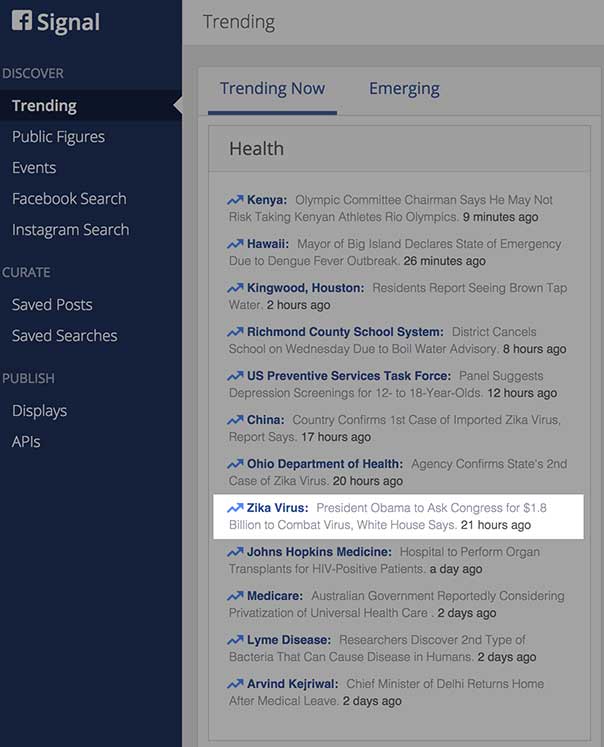Should hospitals use social and digital to talk about Zika Virus?
I am watching the digital curve surrounding Zika virus from inside Google Trends alongside monitoring the amount of conversation on Facebook using the Signal product. It was just yesterday that we noticed that Zika Virus moved to the trending position in Facebook after the media covered President Obama’s announcement surrounding funding to attack Zika virus.
It is absolutely fascinating to watch disease specific and public health matters emerge through the use of digital search and social media conversation. We know that digital listening has become a key component to engage the consumer, taking part in the the digital path as the consumer is using Google to search for information and going to social media channels like Facebook to have conversations with their friends and other thought leaders.
Hospitals and health care organizations have learned from many health crisis that the digital path is key to engaging the consumer, providing information that will ether empower the decision patterns or dispel myths. We also know that leveraging digital listening is another pathway in the decision pattern whether to release public information from hospitals about these large public health issues.
Digital listening should not be the only determinant whether to go public, but can play a vital role how to frame the release public information, when to release, and how to frame the conversation for the community.
I have been watching the Zika virus in two specific areas:
- Google Trends – Indicator of consumer search
- Facebook Signal – Indicator of consumer conversation
When looking at Google Trends, here are a few things I noticed:
1) Google search for Zika virus has been up and down over the last few weeks, and began another up-tick on Monday, February 8th when it was announced that President Obama was going to request $1.8 Billion dollars to address this public health issue.
Why should we care about this as an evolving trend? This showcases the intensity of engagement online as it relates to Zika. When people are interested in information, they use Google as a mechanism to seek information. This showcases the consumers interest over time and using search to find information that is relevant to their daily lives.
2) The Top Five Questions being asked on Google about Zika Virus.
Why is this important? This is a key guide to see what the consumer is asking, a guide for hospitals and health care organizations to frame content as a means to answer the questions consumers are searching for online. So much time is spent inside content strategies trying to figure out what content will be relevant to the consumer, here is a clear guide to what the consumer is truly interested in learning.
3) The intensity of search based on geographic areas in the United States.
Once again, why is this important? I spend lots of time working with hospitals in South Carolina and Texas. This interactive chart allows me to hover over geographic areas, seeking to understand the intensity of search surrounding Zika. Right now hospitals in Texas (specifically in Austin) are showing that there is an increased level of search for Zika (68) compared to the top level of interest in Florida maxed at 100. In Greenville, SC the level of search sits at 36, Columbia, SC is 40, and Charleston, SC 43. This is a scale from 1 – 100.
As you see the shades of blue become darker, the increased level of search is getting close to the max number of 100. If you look at Florida where the Governor has expanded state of emergency to the fifth county, you can match the areas impacted with the level of search. The five counties under a state of emergency are Broward, Miami-Dade, Hillsborough, Lee and Santa Rosa. Each of these counties represent areas of Florida with the highest search level for information.
With increased levels of search in Texas, and the fact there are ten confirmed cases diagnosed, you can see there is a high level of search in Austin (location of the legislature) and Dallas areas.
South Carolina hospitals need to watch the search in our geographic area surrounding Zika, and if it looks like it is starting to increase dramatically, implementing a content strategy that leverages content and Google search to dispel myths and concerns. Let’s take this to the tactical level, using the top trending questions in the Google search:
- What is Zika Virus – Blog Post and/or Video from Clinician answering this question.
- Where is Zika Virus – Interactive map showing where the Zika virus is being found as it relates to your geographic area.
- Is Zika virus contagious? – Clinical expert sharing thoughts via blog and/or video about the virus and how impacts the local consumer.
- How long does Zika virus stay in your system? – Clinical expert sharing thoughts via blog and/or video about the virus and how impacts the local consumer.
- How is Zika virus spread? – Clinical expert sharing thoughts via blog and/or video about the virus and how impacts the local consumer.
Right now…major news outlets are dominating the content games in these areas, providing new information about the virus in these geographic areas and across the nation. Hospitals have a HUGE opportunity to do the following:
- Create a robust content strategy presenting hospitals and health care organizations as thought leaders online.
- Create a social media strategy to not only deliver content, but to engage in conversation online positioning thought leadership directly from health care leadership.
Hospitals MUST decide if and when they talk about the Zika virus online (website, blog, social media, and through earned media outlets). Hospitals have an opportunity to leverage listening tools to gauge the level of consumer interest on the Zika virus, and decide if that is a determining factor to release information digitally, empowering the public with accurate, real time information that does not create pandemonium, but empowers the community to become educated about this public health situation.
Here are some resources to leverage:
Explaination Video from WHO:
Here is the dedicated site to CDC:
http://www.cdc.gov/zika/index.html
Here is a link from Scientific America indicating 10 cases have been reported in Texas and none in SC:
http://www.scientificamerican.com/article/zika-virus-threatens-u-s-from-abroad1/

